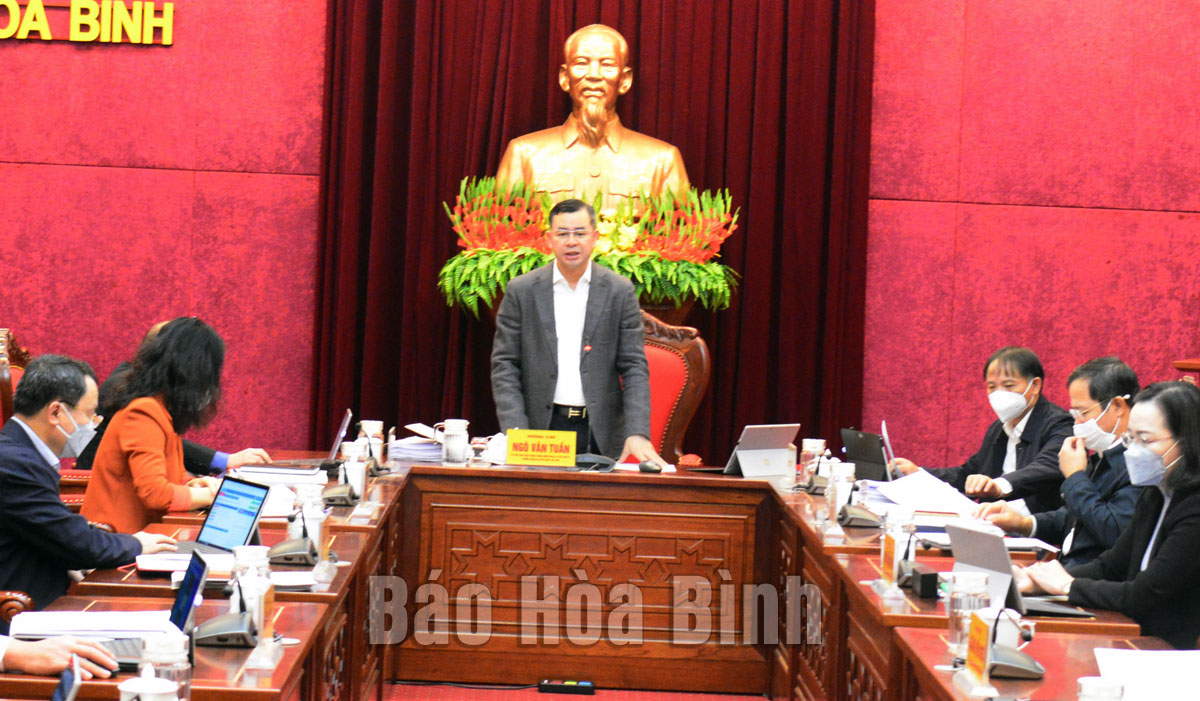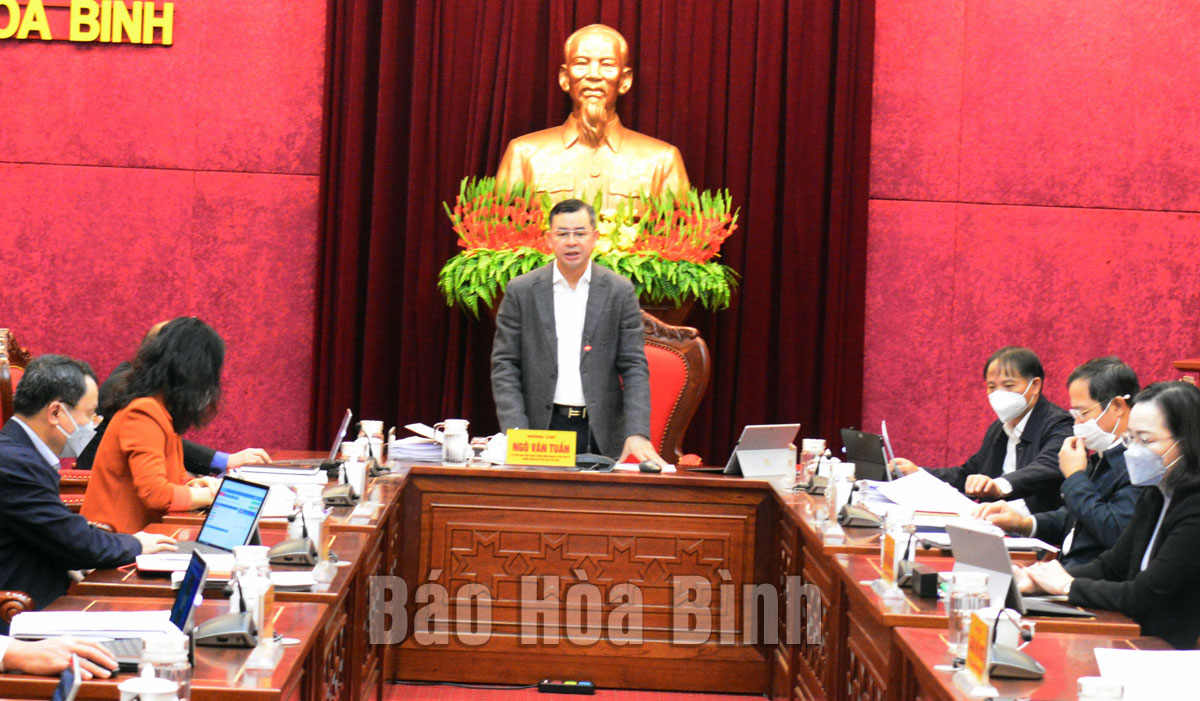
(HBO) - On December 28, Ngo Van Tuan, Member of Party Central Committee, Secretary of Provincial Party Standing Committee (PPSC), Head of Provincial Delegation of National Assembly Deputies presided over the monthly Standing Committee’s meeting to direct on draft reports of environmental protection, sustainable poverty alleviation along with the performance reviews and appraisals of the Standing Committee and its members in 2021.

Ngo
Van Tuan, Member of Party Central Committee, Secretary of Provincial Party Standing
Committee, Head of Provincial Delegation of National Assembly Deputies delivers
the closing remarks.
The
meeting included discussions and directions for the statement of the Provincial
People’s Committee’s Party Civil Affairs Committee, the draft reports and
conclusions by PPSC on
initial reviews after 5 years of implementing the Resolution No. 11-NQ/TU dated
December 30, 2016 on intensifying local pollution control and environmental
protection toward 2020 and vision toward 2025 (Res.11). Accordingly, Res.11 has
resulted in remarkable changes in province-wide environmental protection; state
management strengthened; polluting sources and polluted areas controlled…
Discussions focused on analyzing, elaborating the achievements and highlighting
the shortcomings, especially the urgent issues of great concernto the people, like rural and agricultural pollution situation, problems in
implementing environmental protection regulations, as well as recommendations
for future solutions.
In his closing remarks, Ngo Van Tuan
reiterated the essential significance of environmental protection work in
realizing the 17th Provincial Party Congress Resolution that
emphasized on greener, rapid, sustainable growth, adopting the consistent
guideline of avoiding to pursue economic growth at expense of the environment. Upholding that spirit, more work should be performed in checking, evaluating, analyzing the
causes of successes and failures, learning from experience, recommending the
specific solutions in compliance with practical conditions and viability
prospects.
These include special focus for planning work, planning management,
thorough measures to abolish polluters; providing investment preferences to environment-friendly businesses; dealing with consumers’
pollutants in Hoa Binh City and towns as well as other rural areas; practicing
strict monitoring of stone quarries and construction materials businesses;
attaching great importance to the roles by state and local authorities in
advocating, mobilizing, supervising environmental regulations./.
In the spirit of "Party members go first, the people follow”, all households of Party members in the Doan Ket sub-region in Da Bac town, Da Bac district, voluntarily removed gates and fences, and donated land when the road expansion project passed through their properties. Inspired by their example, 68 households in the sub-region quickly followed suit, contributing over 1,400 sq.m of residential and perennial cropland to widen the main road through the residential area. The exemplary role of Party members in Doan Ket stands as a shining example of studying and following President Ho Chi Minh’s thought, morality, and lifestyle.
The Hoa Binh provincial People's Committee held a monthly meeting on May 29 to assess the implementation of socio-economic development tasks in the first six months of 2025, the progress of key projects, and some other important issues.
During his lifetime, President Ho Chi Minh always expressed his deep affection and special concern for children and youth. He once emphasized: "Caring for and educating children well is the responsibility of the entire Party and the entire people”; "First of all, the family (i.e. grandparents, parents, siblings) must do this job well”. "the Party Committees…, the Children’s Committee, the Youth Union, the education sector, and all related organizations must have specific plans to ensure children grow healthier and more progressive”. His teachings has been remaining valuable and serving as the guiding principles in the work of protecting, caring for, and educating children. In line with this ideology, Hoa Binh Province has continuously been prioritizing and investing resources in the well-being of children in recent years.
Mr. Nguyen Phi Long, the alternate Member of the Party Central Committee and Secretary of the Provincial Party Committee chaired the meeting of the Standing Committee of the Provincial Party Committee to provide opinions on several investment projects within the province. There was the attendance of Ms. Bui Thi Minh, the Permanent Deputy Secretary of the Provincial Party Committee and Chairwoman of the Provincial People’s Council; Mr. Bui Đuc Hinh, the Deputy Secretary of the Provincial Party Committee and Chairman of the Provincial People’s Committee and other members of the Standing Committee; the leaders from other departments, agencies, and some localities.
The Standing Board of the Vietnam Fatherland Front (VFF) Committee of Hoa Binh province held a meeting on May 28 to honour outstanding village elders, village heads, and reputable individuals from local ethnic minority and religious communities.
In mid-May, the provincial Museum organised an exhibition named "Duoi la co Dang Cong san Viet Nam quang vinh” (Under the flag of the glorious Communist Party of Vietnam). This meaningful activity took place in the joyful atmosphere to celebrate the country's major holidays and the Party congresses at all levels for the 2025-2030 term, towards the 14th National Party Congress.



